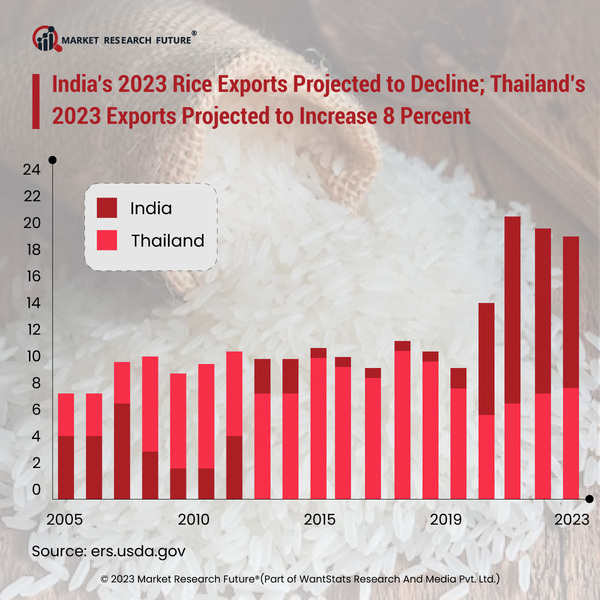Rice Production Trends in 2023
The international monetary fund (IMF) warned about global food inflation in 2023. The consequences of food inflation are shortages of food grains and a ban on rice exports from rice-producing countries, among others.
India is among the world's most extensive rice exporter countries, accounting for around 40 percent of worldwide rice exports, along with Thailand, Vietnam, the United States, and Pakistan. More than half of the rice belongs to non-basmati white rice varieties. According to International Rice Research Institute (IRRI), rice is pivotal in handling malnutrition and hunger-related issues in Southeast Asia. It is the staple food of that region and comprises 48 million hectares of land, equaling 30 percent of the world's rice harvest. IRRI aims to achieve sustainable development goals by 2030 with research and development in rice-based agri-food systems. In June 2023, Thailand became the top rice exporter to Iraq, replacing India. The World Bank views Thailand's economy as expected to accelerate 3.9 percent in 2023 up from 2.6 percent in 2022 due to rising private consumption growth demands from China, Europe, and the United States.
Based on information from other sources, Bangladesh, Nepal, and Africa are the biggest buyers of Indian non-basmati rice. Still, the main buyers of Basmati rice are the Middle East and Central Asian countries. The prices for non-basmati rice may be seriously affected in the global market due to the country's export ban, citing the expected food inflation of 2023. Also, irregular monsoon in India has affected the harvest and rise in rice prices domestically. Various technological advancements in agriculture, such as space technologies and other incentives, can lead to good rice production within the upcoming years from 2023. Recently, Vietnam has been promoting the mechanization of the collection of rice straw and its handling and processing technologies initiated by the Ministry of Agriculture and Rural Development (MARD) in 2023. The program's main aim is to make the agricultural sector aware of sustainable farming practices with rice straw composting, like mushroom production and the production of rice straw pots, among others. This initiative may help to meet the proper decomposition of the rice straws and achieve the country's sustainable development goals.






